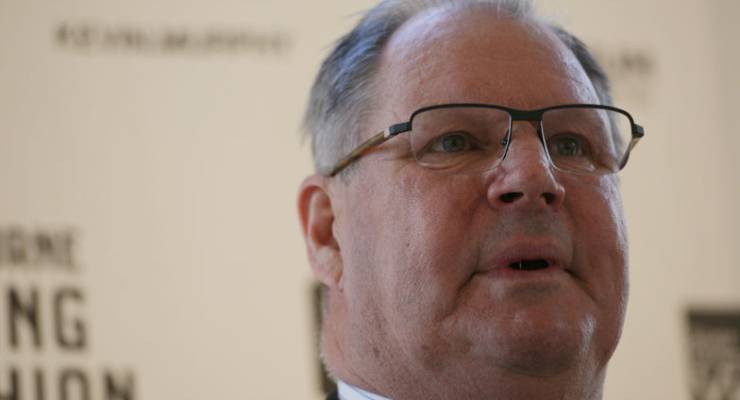
After eight years in power, Melbourne’s lord mayor Robert Doyle enjoyed his first council meeting with majority control last night after justice Greg Garde of the Victorian Supreme Court delivered this judgment last week.
The judge, following an application from the Victorian Electoral Commission, removed an incumbent councillor Michael Caiafa after five months in office and installed two new councillors: Nicolas Frances Gilley, who will serve with the lowest primary vote in history, and former deputy lord mayor Susan Riley, whose presence will give Team Doyle six of the 11 votes.
The whole saga was triggered by the election of indigenous candidate Brooke Wandin, who was then dobbed in by her former running mate, defeated Labor councillor Richard Foster, for being enrolled incorrectly at his house in Kensington.
Wandin resigned after being declared elected by the VEC, but before she was sworn in, and we then spent 5 months in legal processes resolving how she would be replaced.
Independent local paper CBD News has comprehensively covered both the Caiafa removal and the arrival of Nicholas Frances Gilley, a Brit from a wealthy pub-owning family who later picked up an MBE for his work on homelessness, before migrating to Australia and becoming the CEO of the Brotherhood of St Laurence.
As was explained in this Crikey piece three weeks ago, Team Doyle has only secured control because of the group voting ticket I lodged, which is now deeply regretted as explained in this rejected submission to the judge.
Having urged voters to stop a Doyle majority, thanks to the intervention of the VEC and a judge, my group voting ticket has now delivered just that. Psephologist Malcolm Baalman took a powerful swing at both this particular decision and the use of group voting tickets in general in this recent blog post.
Rather than candidates and backroom preference negotiators making these decisions, surely it is better to put matters directly into the hands of the voters, as now occurs in the Senate.
Michael Caiafa, a long-term trader at the Queen Victoria Market, was expected to appeal Garde’s decision in the Victorian Supreme Court but received legal advice suggesting such a move was unlikely to succeed. To overturn a decision of the Victorian Civil and Administrative Appeals Tribunal (VCAT) you have to first seek leave to go to the Supreme Court, and argue that there has been an error in law.
After a discussion with the lord mayor, Caiafa agreed to resign without appeal after Doyle agreed to put up a motion for the council to make a $20,000 contribution to cover his legal fees — something Garde recommended in his judgment.
The lord mayor’s motion is expected to be unanimously approved by councillors next Tuesday — the final day that parties in the VCAT case can lodge an appeal.
As the last man standing between Robert Doyle and majority control of council, it is tempting to go with the appeal in order to try and resurrect the original decision of magistrate Michael Smith, which would have had Nic Frances Gilley replace Brooke Wandin in a count-back — without the additional disruption of replacing Phil Cleary’s candidate Michael Caiafa with another Team Doyle councillor.
However, there will be no council support for any legal expenses incurred in such an appeal, so it would require some crowdsourcing or pro bono legal representation to give it a run, and time is running out.
*Former City of Melbourne councillor Stephen Mayne was not paid for this item.








There will be no appeal. There is no grounds for an appeal. the high Court decision was clear and the judgement by VCAT president sound.
The real issue is the way in which the vote is counted. The system is outdated and seriously flawed.
The system that is in place was designed to facilitate a manual counting process. With the use of computer based technology the flaws in the way the vote is counted an no longer be justified
There is a need for a Parliamentary Review into the Local Government electoral system.
We need
1. a weighted Surplus transfer system,
2. a single transaction distribution of preferences per candidate. This is best done by introducing a re-iterative counting process where the count is reset and restarted following each candidate(s) exclusion from the count. Quota adjusted in each iteration
3. We should also scrap the Droop Quota and adopt a pure proportional system (X/Y)
Stapehen Mayne has known about these flaws for over four years and he did nothing t address these issues. Now he complains and still does not seek to have a proper inquiry into the system.
The Victorian Parliament Electoral matters Committee is the appropriate body to undertake the inquiry.